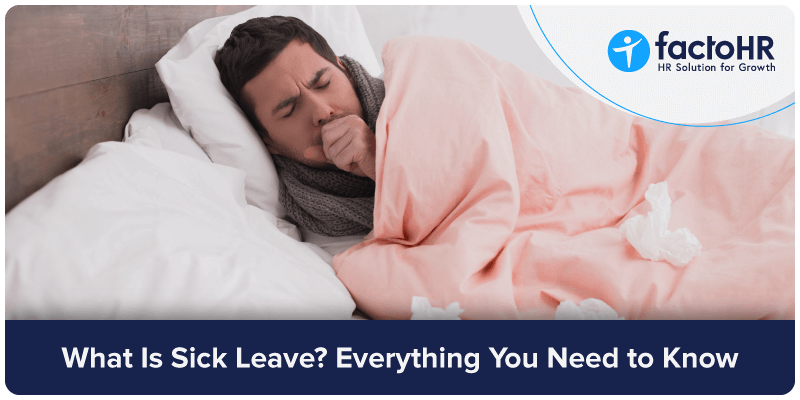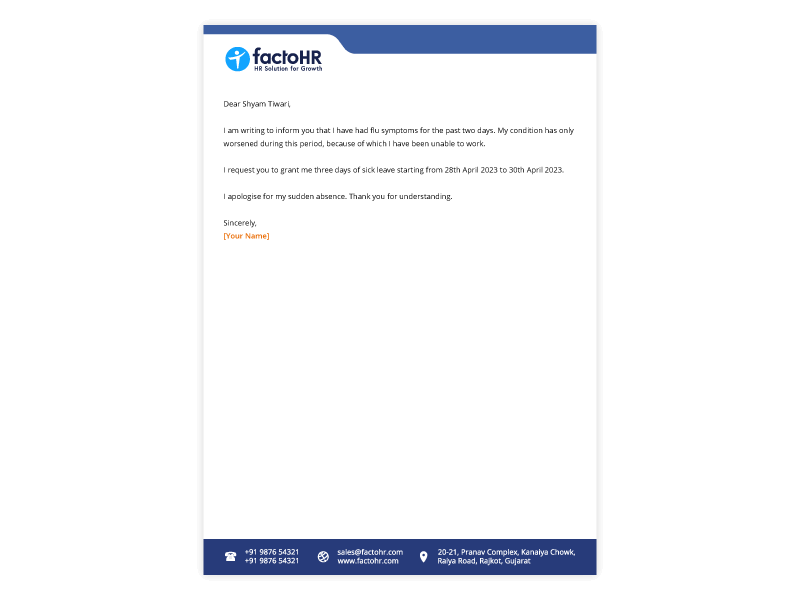What Is Sick Leave? Everything You Need to Know

Table of Contents
Meaning of Sick Leave and Medical Leave
Employee health benefits are one of the major attractions for acquiring good talent. Paid time off when they are sick forms a crucial part of it. Sick leave and medical leave are interchangeable terms, which are used to refer to a time period when an employee takes off from work because of medical reasons. Some organisations might use these terms differently depending on the duration of the leave applied.
Sick leave
usually refers to short periods of leave, generally a day or two, due to a brief illness, for example, an employee may take sick leave to recover from a cold, flu, or migraine. Employees can avail of sick leave to recover from minor illnesses without having to use their leaves for vacation time, and without losing pay.

Medical leave
refers to a longer duration of leave, in general, due to a more serious medical condition like surgery, or a chronic illness. These could be medical symptoms which might require continued medical attention and care. In some cases, where the organisation has it in their policy, medical leave can be used by the employee to take care of a member of the family suffering from a medical condition.
While there not be major ones, some policies and procedures for sick leave vary from one employer to another depending on the local laws applicable and their own rules. Some employers may request the employees to provide supporting documents, like a medical certificate from a certified medical practitioner when they apply for sick/medical leave.
Indian government laws for sick leave and medical leave are as follows:
The Employees’ State Insurance Act, 1948
This act states all the benefits to employees who are covered under the Employees’ State Insurance Scheme. The scheme issues cash benefits to employees during their sick leave period.
The Industrial Employment (Standing Orders) Act, 1946
This act is especially planned for industrial establishments. The rules for granting sick leave to employees are governed by this act.
The Factories Act, 1948
The Factories act controls the laws governing the welfare of workers in factories. According to this act, factories must give sick leave to their employees.
The Maternity Benefit Act, 1961
The Maternity Benefit act was devised for the convenience of pregnant women in India. The act governs the laws for their maternity leave and other benefits. This act allows women to take up to 26 weeks of paid leave during their pregnancy and after childbirth.
The Employees’ Provident Funds and Miscellaneous Provisions Act, 1952
This is another act which deals with employee provident fund and other benefits including sick leave in case of medical issues.
The State and Central Civil Services Rules
Government employees’ need for availing various types of leaves medical and other types of leave is addressed by these rules.
It is always a good idea for employees to check with their HR to fully understand the policies for sick leave and medical leave as they can vary.

Grounds on which employees can be granted sick leave
Some of them are stated below:
Personal health issues
When the employee is unwell and may not be able to perform duties to their full potential or pose a risk to others at the workplace due to the contagious nature of their illness.
Injury
Any injury impairing them from performing their duties, he/she can apply for sick or medical leave.
Chronic medical condition
When an employee suffers from bouts of their chronic illness like asthma or migraine can apply for sick leave.
Medical appointments
Employers can grant sick leaves for the employees to attend medical appointments, like a check-up, diagnostic test, or therapy session.
Mental health issues
Employers who care about employee well being usually grant leaves when an employee is suffering with mental health issues. These issues can range from anything like anxiety or depression, to burnout or other serious issues.
Contagious illness like Covid -19
An employee may take sick leave if they have a contagious illness that could spread to others in the workplace, such as chickenpox or COVID-19. In the recent COVID-19 pandemic, many employers granted sick leaves without any hassle to any employee suffering with Coronavirus.
As earlier stated, the reasons for which sick leave is granted can vary depending on the employer’s policies and the relevant applicable laws.
Abuse of Sick Leave
There are some occasions when employees tend to regularly utilise sick leave in place of casual leave. Managers must first ascertain the pattern and trend before counselling the employee. The HR team should be involved to ensure there is no violation of policies while disciplining the offending employee.
Sick leave letter – Example


Conclusion
The laws of the state obligate employers to provide sick leave. This helps the employees to recover fully without worrying about losing pay and returning to work after full recovery.
Grow your business with factoHR today
Focus on the significant decision-making tasks, transfer all your common repetitive HR tasks to factoHR and see the things falling into their place.

© 2026 Copyright factoHR


